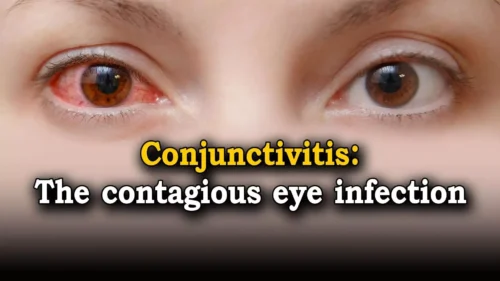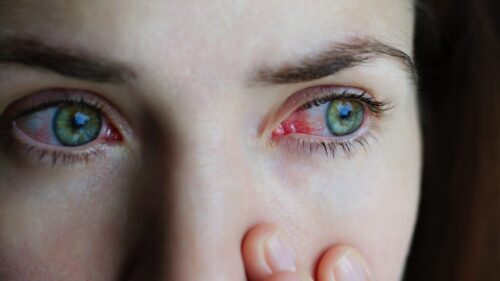
“Learn about common types of Eye Infection and Precaution measures to protect your vision. Discover symptoms, treatment options, and essential eye care tips in this comprehensive guide.”
Introduction
The capacity of us to see and communicate with the world is dependent on our eyes. They are susceptible to infections, though, which can be uncomfortable or possibly result in visual issues. The following article will cover the symptoms that are indicative of eye infections as well as the most significant steps you can take to protect your vision.
Understanding Eye Infections
Eye infections can affect the cornea, conjunctiva, and eyelids, among other elements of the eye. Conjunctivitis (pink eye), styes, blepharitis, and keratitis are a few common eye infections. These infections may be brought on by bacteria, viruses, allergies, or incorrect contact lens care.

Symptoms of Eye Infections
Recognizing the symptoms of an eye infection is crucial to seek timely treatment. Some common signs of an eye infection may include:
- Redness in the eyes
- Itchiness or irritation
- Excessive tearing
- Discharge from the eyes
- Sensitivity to light
- Blurred vision
- Swelling of the eyelids
If you experience any of these symptoms, it’s essential to take precautions and consult a doctor promptly.
How to Prevent Eye Infections
Keep Good Hygiene
The best approach to avoid eye infections is to practice good cleanliness. Wash your hands thoroughly with soap and water before touching your eyes or handling contact lenses.
Avoid Touching Your Eyes
Avoid touching or rubbing your eyes unnecessarily to reduce the risk of contamination from germs on your hands.
Use Protective Eyewear
If you participate in activities that could harm your eyes, such as sports or construction work, wear safety glasses or goggles to protect your eyes from injuries and infections.
Take Care of Contact Lenses
If you wear contact lenses, follow proper hygiene practices. Wash your hands before handling them and clean and disinfect the lenses regularly as per your eye doctor’s instructions.
Avoid Sharing Eye Items
Avoid sharing personal eye items like eye makeup and towels, as they can spread infections. Use your own eye products to minimize the risk.
Be Cautious with Eye Makeup
Using expired or contaminated eye makeup can lead to infections. Replace your eye makeup regularly and avoid using it when you have an eye infection.
When to Seek Medical Attention
Do not delay in seeing a doctor if you think you may have an eye infection. If left untreated, some eye infections can quickly get worse and result in significant problems. If your symptoms don’t go away, consult a doctor.
Treatment Options for Eye Infections
The kind and severity of an eye infection determine the appropriate course of treatment. Utilising eye drops, ointments, or oral drugs may be necessary. According to your condition, your eye specialist will advise the best course of action.

General Eye Care Tips
In addition to preventing eye infections, take care of your overall eye health:
- Get regular eye check-ups to detect any issues early on.
- Eat a balanced diet with eye-healthy nutrients like vitamin A, C, and E.
- Wear sunglasses outdoors to protect your eyes from harmful UV rays.
- Take breaks during extended screen time to reduce eye strain.
Conclusion
It’s important to keep your eyes healthy and free from infections because they are quite valuable. You can greatly lower your chance of developing eye infections by being aware of the signs and taking precautions. To minimise any potential problems, get medical help as soon as you notice any symptoms of an eye infection.
FAQs
1. Can eye infections cause permanent vision loss?
Most eye infections are treatable and do not lead to permanent vision loss. However, severe infections left untreated can affect vision. Early medical attention is crucial.
2. Can I wear contact lenses during an eye infection?
It’s not advisable to wear contact lenses during an eye infection, as they can worsen the condition. Stick to wearing glasses until your eye doctor approves.
3. Is conjunctivitis contagious?
Yes, conjunctivitis (pink eye) can be highly contagious, especially in viral or bacterial forms. Take precautions to prevent its spread.
4. How can I soothe irritated eyes?
Applying a cold compress and using preservative-free artificial tears can provide relief. Consult an eye care professional if irritation persists.
